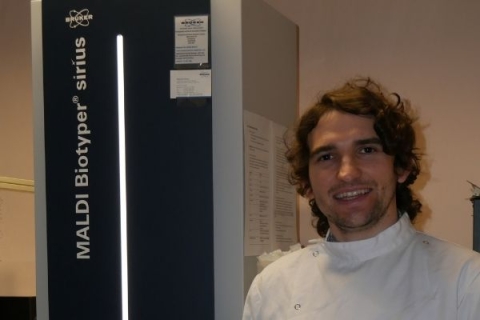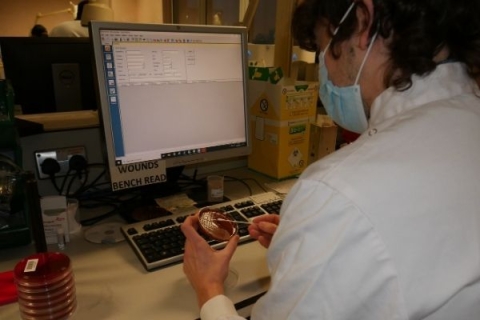

Senior Biomedical Scientist Simon Munro tells us about his role and how he has to adapt to a rapidly changing field
3 min read
British Science Week is a national event that provides a platform for educators, professionals, communicators and the public to recognise and celebrate the work being undertaken in STEM related fields (Science, Technology, Engineering, Maths). This year’s theme is ‘Innovating for the Future’ and, with so many Portsmouth graduates working in STEM, we wanted to showcase the important work they’re doing and how they are innovating for the future in their roles.
Simon Munro graduated in 2009 in BSc (Hons) Biomedical Science and is a Senior Biomedical Scientist and Quality Lead in Microbiology for Hampshire Hospitals NHS Foundation Trust. We asked Simon to tell us about his role, his journey since graduating and his advice for students and graduates thinking of working in STEM:
Choosing to study biomedical science at Portsmouth meant I was able to enter my current career directly from university. The course taught me the basic knowledge and skills that I still use on a daily basis and I was able to achieve my professional registration through a placement. All of this put together saw me secure a role in the NHS shortly after graduating.
I am proud to be part of a forward-thinking department in which we continually try and innovate our own processes to improve patient care. An example of this has been my role to lead the implementation of a new analyser; the MALDI Biotyper. This has improved and dramatically reduced the length of time for the identification of organisms, which is critical in conditions such as sepsis.
Simon Munro, BSc (Hons) Biomedical Science (2009), Senior Biomedical Scientist Quality Lead, Hampshire Hospitals NHS Foundation Trust

Working in the NHS is frequently challenging, but is also rewarding. A persistent but adaptable approach helps you thrive in this rapidly changing field.
I have progressed in my career to Senior Biomedical Scientist for the Microbiology Department of Hampshire Hospitals NHS Foundation Trust. The department performs testing on a wide range of specimens to aid in the diagnosis and management of infections for patients. Specimens are received from the three hospitals of our Trust (Basingstoke, Winchester and Andover) and GP surgeries spread across Hampshire.
My role as a Senior Biomedical Scientist includes assisting in processing, interpreting and reporting tests across the department along with a team of laboratory assistants, associate practitioners, biomedical scientists and clinicians. I have further duties as a quality lead to ensure our tests are performing as they are intended for patient safety and to investigate when errors occur to prevent them from happening again.
One of the main reasons I enjoy microbiology is that it is still very hands on - you get to see the bacteria grow on agar plates and view them under a microscope using a technique over a century old - the Gram stain. This is complemented by using much newer technologies which can produce results in minutes allowing patients to receive better care.

During the past year we have had to adapt our laboratory to offer testing for COVID-19 and it demonstrates to us all that, despite medical improvements, pandemics are not confined to the past and we will face further challenges in the future such as antimicrobial resistance.
This past year has felt like a rollercoaster. There's been times where staff absences and short notice changes to testing have made for long and tiring days at work but these have been mixed with moments of joy and hope, which include receiving donations of food and gifts from the public and meeting many new staff members who are keen to support our testing efforts.
My advice for students and graduates looking to get into STEM:
Look for opportunities to visit or work in the areas you feel you would like to end up in before you decide upon your profession. These should provide you with realistic perspectives of workplaces and can give you better knowledge, experience and connections that can help you secure and begin the first role of your career.
